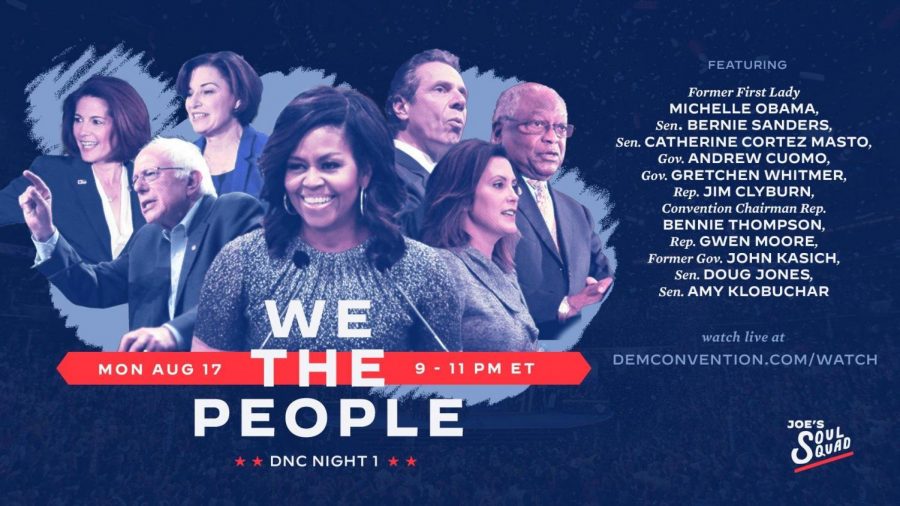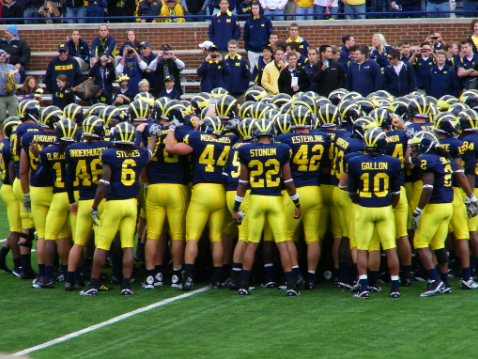Democratic National Convention, Night 1: Three Themes of Attack
Promotional graphic for the first night of the Democratic National Convention, featuring a diverse array of speakers laser-focused on three themes of attack against Trump: his record on racial relations, his handling of the coronavirus pandemic, and his targeting of the post office. Graphic credits: Joe’s Soul Squad.
The Democratic National Convention to officially nominate Joe Biden and Kamala Harris to the Democrat ticket of president and vice president, respectively, kicked off on Monday night, August 17, with a first day stacked with both familiar faces and rising stars in the party. Originally scheduled to be hosted in-person in July, due to the pandemic the convention was postponed to August and featured a mix of live and pre-recorded speeches. While the result could be stilted or jarring at times, especially without an audience present to applaud, the overall effect was commendable given the unprecedented circumstances of hosting a convention during a pandemic.
The convention was originally slated to be held in Milwaukee, in the key swing state of Wisconsin; while foiled by the pandemic, the night nonetheless opened with remarks from Representative Gwen Moore (D-WI), the congresswoman from Milwaukee, who referenced the city’s past as a hotbed for abolitionism, labor rights, and feminism. Democrats have been aiming to recapture the Midwest ever since Hillary Clinton’s bruising 2016 defeat in Michigan, Wisconsin, and Pennsylvania, but the pandemic has prevented any serious in-person campaigning. Following this brief introduction, the night largely divided into three broad themes: racial justice, public health, and voting rights.
Part I: Racial Justice
The Democrats leaned heavily on the theme of racial justice throughout the first half of the convention’s first night, with several key speakers all delivering remarks revolving around the national movement against police brutality following George Floyd’s death in May 2020. In the midst of seismic shifts in public opinion, the Democrats have sought to frame the campaign as one of discord against solidarity; the underlying theme of all the speeches focused on characterizing President Donald Trump as a divisive figure, contrasted with Biden as a force for unity.
Washington, D.C. mayor Muriel Bowser, speaking from a backdrop of the recently renamed Black Lives Matter Plaza, characterized the recent protests as just one link in the narrative of racial equality, drawing comparisons with Martin Luther King Jr.’s March on Washington in 1963. Bowser has emerged as a vocal opponent of President Trump in recent months and explicitly condemned his teargassing of peaceful protesters in order to clear the way for the infamous photo-op of him holding a Bible.
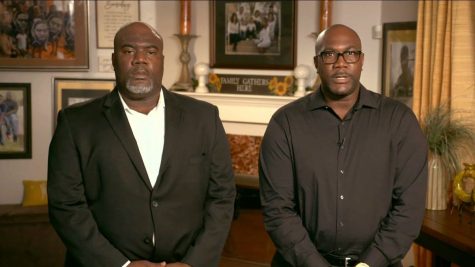
Bowser also introduced George Floyd’s surviving brothers, Philonise and Rodney Floyd, who described the protests as being a fitting legacy for their brother. Nonetheless, they warned that the fight needed to be continued. Quoting the late Congressman John Lewis (D-GA), they called for “good trouble” to be done, in order to continue fighting for other victims whose “murders didn’t go viral”, and to ensure that their names would not be forgotten—such as Breonna Taylor, Eric Garner, and Stephon Clark. A moment of silence was then held for all victims of police brutality, another unprecedented event at a presidential convention.
Biden himself then appeared with a panel of prominent figures in the racial justice community: social justice activist Jamira Burley, Chicago Mayor Lori E. Lightfoot, Houston Police Chief Art Acevedo, NAACP President Derrick Johnson, and author Gwen Carr, mother of Eric Garner, the black man also killed by a police officer in 2014 while uttering the words “I can’t breathe”. Carr in particular stressed the need to hold politicians’ “feet to the fire” and urged Biden to make sure national, state, and local laws were passed reforming police policy. Biden emphasized again that “most cops are good, but the bad ones have to be identified, fired, and prosecuted”, and agreed with Acevedo’s policy suggestions of enforcing national standards for policing and abolishing chokeholds.
Finally, House Minority Leader Jim Clyburn (D-SC) gave a live speech addressing the reasons for his endorsement of Biden. The third-ranking Democrat in the House and the dominant Democratic figure in South Carolina, Clyburn had made arguably one of the most influential endorsements in history when he endorsed Biden in the 2020 primaries, right after Biden’s three dismal defeats in Iowa, New Hampshire, and Nevada. The endorsement injected a surge of energy into the Biden campaign and delivered him an overwhelming victory in South Carolina, which put Biden in place to win across the board on Super Tuesday and thereby cruise to the nomination.
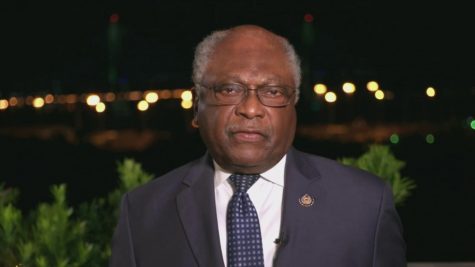
Clyburn emphasized that his decision was made with his “feet firmly planted in this community”, mentioning South Carolina’s history as one of the linchpins of the Atlantic Slave Trade as well as the recent Charleston church shooting in 2015. He concluded by describing Biden as “adopted son of South Carolina” and reiterated again that “We know Joe, but more importantly, Joe knows us”. Biden’s solid African-American support has long been a theme of the 2020 campaign, and in this moment of national racial reckoning it will doubtless be in effect as he prepares to go head-to-head with Donald Trump in the fall.
Part II: COVID-19
The second part of the night’s speeches revolved primarily around the COVID-19 pandemic, which has (of the time of writing) infected nearly 6 million Americans and killed 170,000. The Democrats’ messaging has focused on criticizing Trump for an uncoordinated response to the pandemic by initially downplaying its severity and for rejecting the scientific consensus, while portraying Biden as a force of reason who would take such threats seriously and listen to scientific advice when enacting policies.
The first speaker focusing on the pandemic was New York Governor Andrew Cuomo (D-NY), seen as a rising star in the party and a potential future presidential contender. Cuomo has won wide praise for his handling of the pandemic despite New York’s high death toll, which remains the highest in the nation at 32,000 and the second-highest per capita, behind only New Jersey. Cuomo proclaimed that New York had “climbed the impossible mountain” by flattening the curve, before affirming that “Covid is the symptom, not the illness”. He went on to extend the metaphor by emphasizing “only a strong body can fight off the virus, and America’s divisions weakened it. Donald Trump didn’t create the initial division. The division created Trump; he only made it worse.”
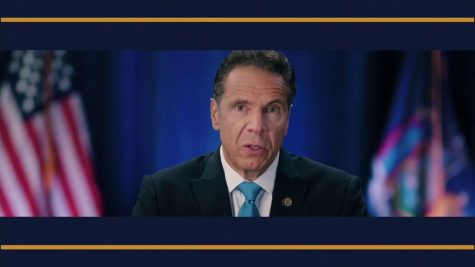
Cuomo then turned to steps to alleviate the pandemic. He stressed the importance of government as a force for good and urged all Americans to wear masks “because we’re smart, and care about each other”, to socially distance because “staying away shows how close we actually are”, and to test, trace, and do anything that is necessary to defeat the virus because “we’re America, we win wars, and we’re the greatest country on the globe”. He went on to praise Biden’s candidacy, describing him as “America tough—tough in the best way, tough that is smart, united, disciplined, and loving.” He concluded by proclaiming “Joe Biden can restore the soul of America, and that’s exactly what our country needs today.”
Aside from the politicians, the convention also featured testimonials from many ordinary supporters of Biden, frequently featuring former independent or Republican voters who had decided to vote for Biden instead. One of the night’s most stinging critiques of Trump came from one of these ordinary voters: Kristin Urquiza of Maryvale, Arizona, daughter of a Trump voter who died from COVID. In arguably the best rebuke of the convention’s first night, Urquiza declared “My dad was a healthy 65-year-old. His only pre-existing condition was trusting Donald Trump, and for that he paid with his life.”
Following a round-table with frontline medical staff hosted by women’s soccer champion Megan Rapinoe, as well as a brief interlude by Maine Senate candidate Sara Gideon, another rising star took the stage. Michigan Governor Gretchen Whitmer (D-MI) won the key Midwest state wit a sizable margin of 10 percent in her 2018 election, and was rumored to be Biden’s vice presidential pick before his ultimate decision to choose Kamala Harris. Nonetheless, Whitmer was afforded a prime spot at the convention, and from the very beginning she came out guns blazing—sarcastically calling herself “that woman from Michigan”, the label Trump had reportedly foisted on her.
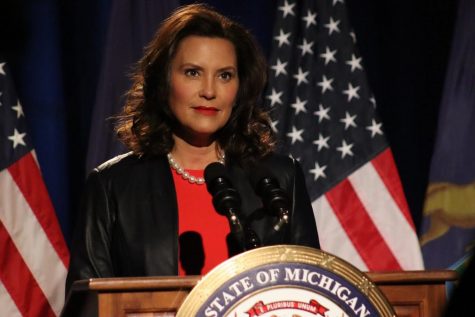
Whitmer continued by praising the Obama administration’s rescue of Michigan’s auto industry during the 2008 Recession, saying that “President Barack Obama and Vice President Joe Biden didn’t waste time blaming anyone else or shirking their responsibility – they got to work.” In the end, the preservation of the auto industry paid huge dividends, with Michigan’s auto workers quickly switching to the production of medical equipment. In Whitmer’s words, “President Obama and Vice President Biden saved these auto workers’ livelihoods. Then these workers did their part to save American lives.” She concluded by asserting the need for “science, not politics or ego” to drive decisions, something which she promised would be the case under a Biden administration.
Intermission: The Never-Trump Republicans
Serving as a interlude to the final section of the convention’s first night was a quartet of lifelong Republicans who had defected from their party to endorse Joe Biden for President: Christine Todd Whitman (R-NJ), former Governor of New Jersey; Meg Whitman (R-CA), CEO of Quibi and gubernatorial candidate in 2010; Susan Molinari (R-NY), Congresswoman for 7 years; and John Kasich (R-OH), former Governor of Ohio. While all four acknowledged their Republican roots, they each stressed the need to cross party lines and vote for Biden. As early as the 2016 GOP primary, in fact, Kasich had made a name for himself as a loud Trump critic, refusing to endorse him afterwards and writing in John McCain during the election.
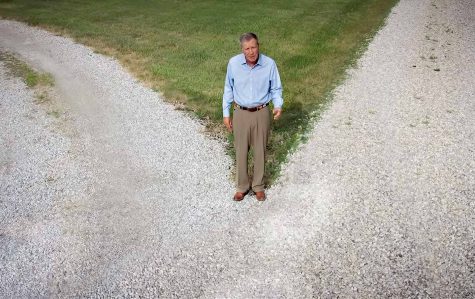
Kasich’s case was particularly compelling, not least because of the four of them, he had the greatest national standing. Literally standing at a crossroads as he delivered his remarks, he proclaimed that “America is at a crossroads…The stakes in this election are greater than any other in modern times.” He cast President Trump as a uniquely unsuited leader, and though he acknowledged his lifelong Republican ties, he emphasized “but that attachment holds second place to my responsibility to my country”. Republicans, Kasich asserted, were founded on “ principles of unity and a higher purpose, but what I have witnessed these past four years have belied those principles.”
Following Kasich’s remarks, freshman senator Doug Jones (D-AL) took the stage. One of the most vulnerable Democrats up for re-election in 2020, Jones began by leaning heavily into his Alabama roots, acknowledging that “growing up in the South meant growing up in the midst of stark divisions” but also stressing how Alabama was the site for Rosa Park’s bus boycott and John Lewis’s march at Selma, and that “even our deepest divisions can be overcome”. Jones, a good friend of Biden’s (having “met him as a wide-eyed law student”), concluded by asserting “the Joe I know is exactly the leader our country needs right now.”
Part III: Voting Rights
The last major topic of the evening was voting rights, particularly the recent debate over the Postal Service and mail-in voting. Many Democrats have expressed alarm over the Trump administration’s recent funding cuts to the Postal Service, especially the actions taken by Postmaster General Louis Dejoy in removing many supposedly underused mailboxes. In the final section of the convention, Democrats once more renewed the call for mail-in absentee voting to be allowed.
Nevada Senator Catherine Cortez Masto (D-NV) was the first speaker to discuss the issue. Another rising star in the party, Cortez Masto was rumored to be a vice presidential pick for Biden but publicly stated she would decline it if offered. From the background of her kitchen, she described the benefit of Americans “marking their ballots at the kitchen table, and exercising one of our most fundamental rights from home”. She praised Nevada’s vote-by-mail system, which mails a ballot to every voter this election; similar systems are in place in 8 other states as well as Washington, D.C.
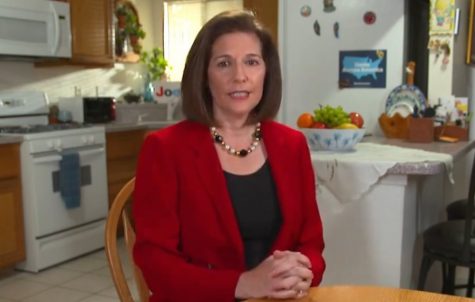
Cortez Masto described voting by mail as being a “secure, proven option for decades” and even pointed out how Trump himself requests absentee ballots to vote by mail. Cortez Masto went on to criticize Trump for his attacks on Nevada’s voting system, having withheld federal aid to Nevada and filed a lawsuit against it. She lamented that “now he is putting the lives of Nevada’s seniors at risk by trying to defund the post office. Here’s what that means: they won’t be able to get their prescriptions, because he wants to win an election.” She concluded with a fiery peroration: “Nevada is not intimidated by you; America is not intimidated by you.”
Continuing off Cortez Masto’s message, Senator Amy Klobuchar (D-MN) likewise defended the Post Office and voting by mail. Regarding voting rights, Klobuchar supplied one of her famous quips, saying “the president may hate the post office, but he’s still going to have to send them a change of address card come January”. On a more serious note, she asserted that “I believe that the right to vote is fundamental, and the Post Office is essential” and criticized Trump for attempting to sow division in America.
One of Biden’s rivals for the 2020 presidential campaign, Klobuchar had endorsed him in the wake of his South Carolina victory and delivered him her home state of Minnesota. In return, she was rumored to be in the running for vice president for months before the George Floyd protests dashed her hopes, as Klobuchar had previously declined to prosecute one of the officers. Nonetheless, Klobuchar still spoke positively of her experience endorsing Biden, describing the moment of her ending her campaign as one of “great joy, because the day I ended my campaign was the day I endorsed him”.
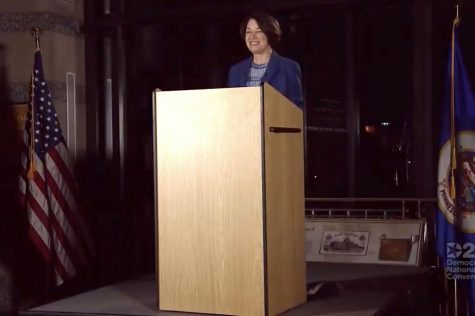
Klobuchar’s speech was followed by a montage of various 2020 presidential contenders all speaking about Biden and their reasons for endorsing him, from Beto O’Rourke to Seth Moulton to Tom Steyer to Kamala Harris, his eventual Vice Presidential pick. It represents a remarkable coalescing of the party around Biden despite the deeply divisive primary; much of that can be attributed to the Biden campaign’s unprecedented efforts to court the various factions of the party into supporting him, a decision that ultimately paid off as the Democratic Party heads into the general election mostly united around him.
Part IV: Finale
Following a final interlude from Congressman Cedric Richmond (D-LA) discussing economic justice, the finale of the night approached with statements from the two of the most recognizable faces in American politics: Senator Bernie Sanders (I-VT), the standard-bearer of the progressive left and Biden’s most serious primary opponent, and Michelle Obama, wife to President Barack Obama and former First Lady. Their remarks took up the last half-hour of primetime programming and featured a wide variety of topics, and represented the culmination of the night’s themes and messaging.
Sanders, delivering his speech live, began by framing the current American situation as “an unprecedented moment”, facing world health and economic crises, confronting systemic racism, and the looming danger of climate change. To make matters worse, Sanders continued, Americans also had a “a president who is leading us down the path of authoritarianism”, making the 2020 election the most important in modern history. In response to these unprecedented crises, Sanders asserted, “an unprecedented response” was needed, a movement that would take the fight “against greed, oligarchy, and bigotry”.
Sanders then took a moment to address his endorsement of Joe Biden despite their intense primary competition. He called on his millions of supporters to support Biden, and thanked them for their love and support as well as “showing us all that we all yearn for a nation based on the principles of love, justice, and compassion”. The progressive movement, Sanders asserted, had not ended; instead “our movement continues and gets stronger every day”, with ideas that even a few years ago would have been considered radical now becoming part of the mainstream.
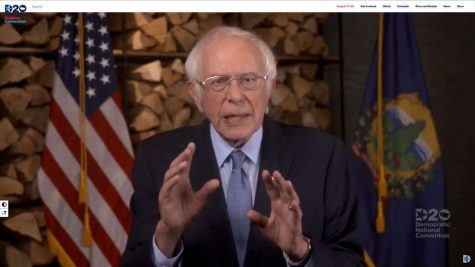
He went on to warn that “If Donald Trump gets re-elected, all the progress we have made will be in jeopardy”; under the Trump administration, “the unthinkable has become normal”, from trying to prevent people from voting, dismantling the postal service, deploying military against peaceful protesters, threatening to delay the election, and suggesting if he loses he will not leave. ”This is not normal, and we must never treat it like it is,” Sanders said. “Authoritarianism has taken root in this country…I will work with progressives, with moderates, and yes, conservatives against a threat that so many of our heroes fought and died to defeat”.
Sanders then turned to criticizing Trump’s record on health and the economy, asserting “by rejecting science, he has put our lives and health in jeopardy; Trump has attacked doctors and scientists trying to protect us from the pandemic”. In another stinging rebuke of the sitting president, Sanders invoked history, saying “Nero fiddled while Rome burned…Trump golfs.” He also accused Trump of exacerbating the economic crisis, with over 30 million unemployed and many off their health insurance, by cutting emergency funding and threatening the future of Social Security and Medicare. “Even before Trump’s negligent response”, he continued, too many hardworking families were caught on an “economic treadmill…with no hope of getting ahead”.
He concluded by pointing out the reasons to vote for Biden, acknowledging that while they had their differences, Biden’s policies included raising the minimum wage to $15, making joining a union easier, creating 12 weeks of paid family leave, funding universal pre-K, making childcare affordable, rebuilding crumbling infrastructure, and fighting climate change by transitioning to clean energy. He described how Biden’s proposals included cutting the cost of prescription drugs and lowering Medicare eligibility age from 65 to 60; he also emphasized Biden’s commitments to reforming the broken criminal justice system by ending private prisons, cash bail, and the school-to-prison pipeline. Lastly, he asserted that Biden would “stop the demonization of immigrants, coddling of white nationalists, racist dogwhistling, religious bigotry, and the ugly attacks on women”. For all these reasons and more, Sanders concluded, “The price of failure is just too great to imagine.”
The final speaker of the night, Michelle Obama, had her speech pre-recorded, though in many ways that fit her personal brand better; set in her house, recorded almost like a close-up, the personal touch and intimacy made it seem more reminiscent of F.D.R.’s fireside chats than the pulpit-pounding rally speeches other politicians were more comfortable with. She began by acknowledging that it’s a “hard time” for America; “I love this country with all my heart and it pains me to see so many people hurting”, she said.
Transitioning to discussing politics, Obama said of the presidency, “The job is hard,” and described it as requiring a “moral compass and an ability to listen” as well as the “abiding belief that each of the 330 million lives in this country has meaning and worth”. She continued by stressing that “Presidents’ words have power to move markets, start wars or broker peace; they can summon our better angels or awaken our worst instincts.” Reflecting on the 2016 election, she lamented that “too many people believe their votes didn’t matter…whatever the reason, those choices sent someone to the Oval Office who lost the popular vote”. With a bit of wry wit, she said, “and we’ve all been living with the consequences.”

Above all, she stressed the importance of empathy—“The ability to walk in someone else’s shoes; the recognition that someone else’s experience has value, too.” Trump’s “emboldening [of] torch-bearing white supremacists” and use of pepper spray and rubber bullets to disperse peaceful protesters, she asserted, “is the America we put on display for the next generation.” Referencing her famous “when they go low, we go high” speech at the 2016 convention, Obama asserted that “Going high is the only thing that works…When we go low, when we use the same tactics, we just become part of the ugly noise”. Nonetheless, she warned: “But let’s be clear, going high does not mean putting on a smile and saying nice things when confronted by viciousness and cruelty.”
She then pivoted to more overt criticism of Trump, commenting that “Donald Trump is the wrong president for our country; he has had more than enough time to prove otherwise, but he is clearly in over his head.” With the faintest trace of disappointment, she commented, “It is what it is…You know I hate politics. But you also know that I care about this nation. If you take one thing from my words tonight—if you think things cannot possibly get worse, trust me, they can and they will.”
She concluded with a spirited push for voting rights, calling on Democrats to “Vote for Joe Biden like our lives depend on it…We have to vote in numbers that cannot be ignored”. She described various voter suppression techniques that might be employed, such as “closing down polling places in minority neighborhoods, purging voter rolls, intimidating voters, lying about the security of our ballots. These tactics are not new, but this is not the time to withhold our vote in protest or play games for candidates who have no chance of winning.” As the first night of the convention drew to a close, she ended: “It’s up to us to add our votes and our voices to the chorus of history…to keep the possibility of progress alive in our time.”

Vincent Jiang is currently a senior at West Morris Central High School and President of Journalism Club. Passionate about global affairs, he enjoys writing...

